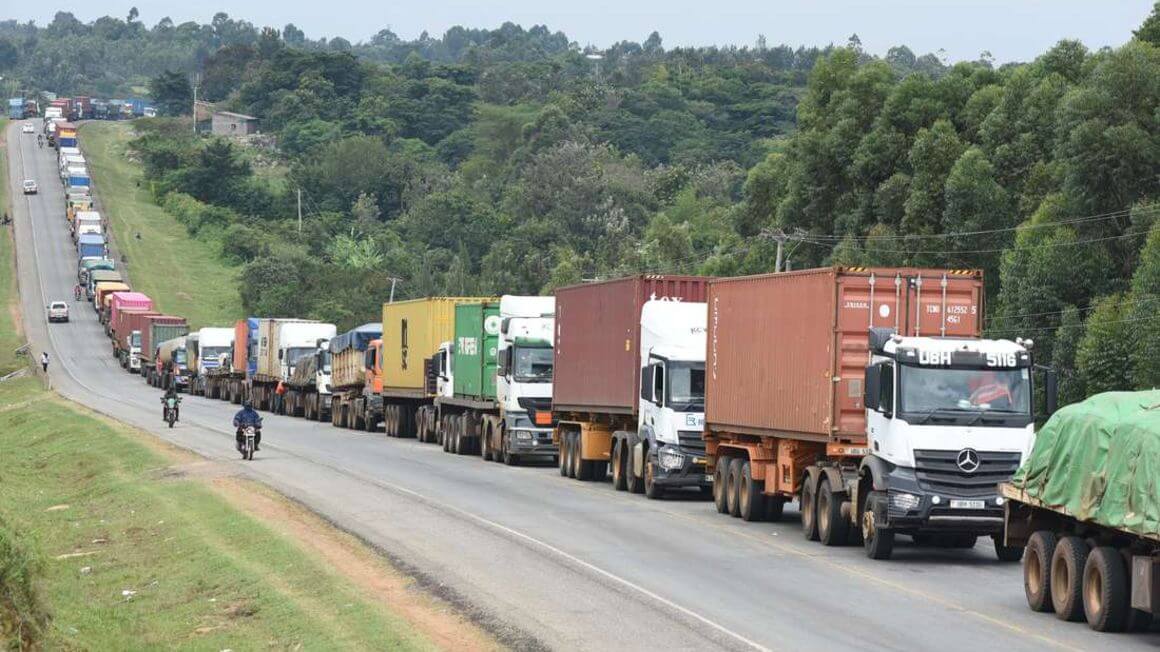
Our Projects are
Transforming African Trade
Quick Contacts
2nd Floor, Fidelity Insurance Centre Waiyaki Way, Westlands

Slow Covid-19 testing result in long queues such as this on Bungoma-Malaba highway, and costly delays. FILE PHOTO | NMG
As the East African economies re-open after many months of hiding from coronavirus, Covid-19 tests have become the latest non-tariff barrier to regional trade.
The EastAfrican reported that Rwandan cross-border transporters are losing money as the impasse over Covid-19 testing of drivers continues to hold up the movement of goods from the port of Dar es Salaam to Kigali. Rwanda too does not accept Tanzanian Covid-19 certificates presented by Tanzanian truck drivers, preferring to do its own tests.
Uganda and Kenya are holding their noses, and looking away pragmatically. They accept anyone’s certificates.
But even with the system “working”, it is still very slow compared to the pro-pandemic times — which themselves were actually quite shambolic.
These Covid-19 penalties, say economists, are now the biggest source of the increase in prices of goods and services in the region.
With projections of vaccines getting to the region at the end of 2021, we are in for some bleak times unless enlightenment descends upon governments soon.
There are ways out if there are people bold enough in East African executive mansions to seize on them. Beyond the health concerns, there is some narrow nationalism, and a sense that competitive advantages might somehow be extracted through this Covid-19 tests politics.
But if that can be overcome, technology offers a path to speed everything up. First, to manage the politics and save face, let a World Health Organisation liaison be attached to two Covid-19 test sites or labs in every country.
Tests done in these labs will not be challenged by another East African Community country.
That leaves the question of how to avoid drivers swapping and cheating in other ways. The best thing would be to embed a microchip in every driver with their Covid-19 status on it.
In fact, a driver can start his journey before his results are back, and it gets uploaded to the chip which would be paired to his mobile phone when he is well on the way. If he fails the test, he doesn’t continue. He turns back. At the border, the drivers would be scanned, and let through. This would also dramatically speed up things. And it would make contact tracing a breeze.
But that would be a step too far. No way a macho, and possibly superstitious, African driver is going to accept a chip insert.
So, the next practical option; have the chip won in an armband, or on their ankles like those things prisoners on parole wear in other lands. Make it impossible for the fellow, unless he cuts off his leg or arm, to remove it.
But perhaps the easiest would be to upload the results on an app on their mobile phones. Yes, the phone could be given to someone else, and a lucrative black market could develop around tests. Close that door with two-factor authentication, with one being either the fingerprint or the face.
Something like that can be set up over two months so that by Christmas we are all happy and exuding good neighbourly love.
Read the original article
Disclaimer: The views and opinions expressed in this article are those of the authors and do not necessarily reflect the official policy or position of TradeMark Africa.